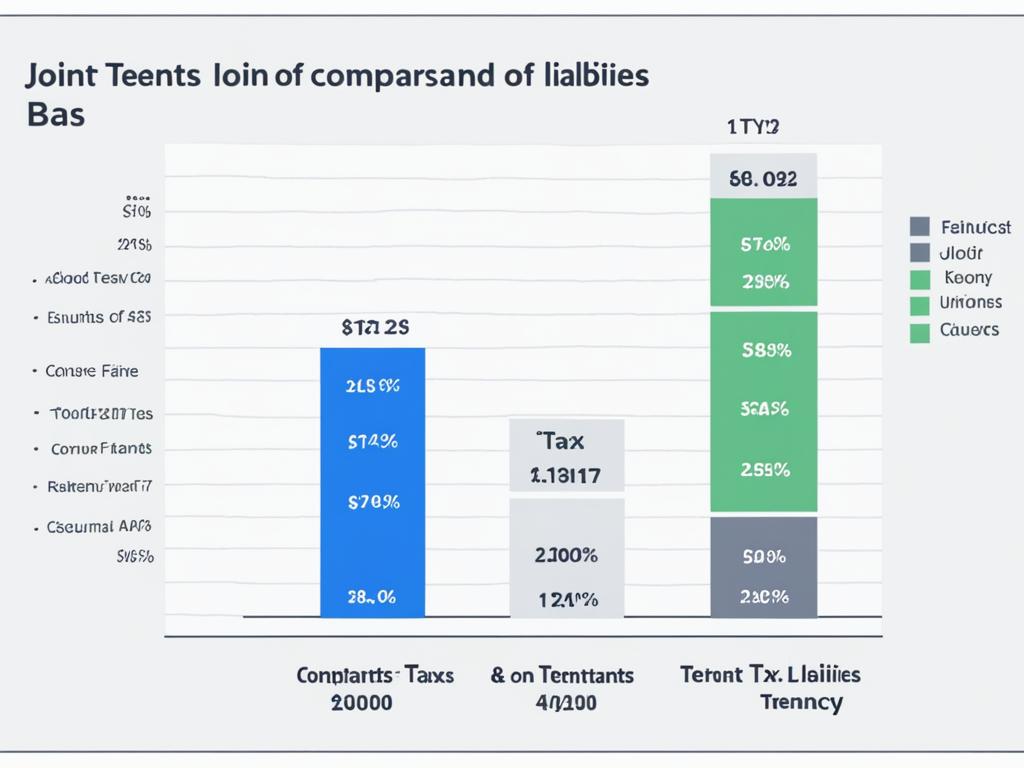Joint Tenancy: Tax Implications Explained
Joint tenancy is a popular ownership strategy that allows individuals to co-own property together. However, it is crucial to understand the tax implications associated with joint tenancy, particularly for joint tenants with rights of survivorship. By being aware of the tax benefits and potential drawbacks, you can make informed decisions regarding your property ownership.
Key Takeaways:
- Joint tenancy has tax implications that should be carefully considered.
- Surviving joint tenants may benefit from tax advantages.
- Joint tenancy enables the avoidance of probate.
- However, it can also lead to issues with control and distribution of assets.
- Consulting with professionals will help determine the best ownership strategy for your specific circumstances.
Understanding Joint Tenancy Ownership
Joint tenancy is a popular form of co-ownership that allows multiple individuals to hold an equal share in a property. This arrangement is commonly utilized by married couples, friends, life partners, parents, and children. When one of the joint tenants passes away, their share automatically passes to the surviving joint tenant(s) through the right of survivorship. This feature makes joint tenancy an attractive option for those seeking a seamless transfer of ownership.
Joint tenancy is often chosen as a perceived cost-free alternative to a will, as it helps avoid probate, the legal process of distributing assets upon a person’s death. With joint tenancy, the property passes directly to the surviving joint tenant(s) without the need for court intervention.
“In joint tenancy, each tenant has an equal ownership interest in the property, and the right of survivorship ensures a smooth transfer of ownership upon death. This form of ownership can provide peace of mind and efficiency when it comes to estate planning.”
Joint tenancy can also offer tax benefits, as it can potentially reduce the joint tenants’ overall tax liability. Additionally, joint tenancy simplifies the ownership structure, enabling equal decision-making power among the joint tenants.
Example: Joint Tenancy with Rights of Survivorship
Let’s consider an example to illustrate joint tenancy ownership:
| Joint Tenants | Ownership Percentage |
|---|---|
| John | 50% |
| Sarah | 50% |
In this scenario, John and Sarah jointly own a property with equal shares. If John were to pass away, Sarah would automatically become the sole owner of the property by the right of survivorship. Conversely, if Sarah were to pass away first, John would assume full ownership.
It’s essential to note that joint tenancy should be entered into with careful consideration. While it offers certain advantages, there may also be potential drawbacks, such as limitations on control and tax implications. It’s crucial to consult with legal and tax professionals to fully understand the implications of joint tenancy in your specific circumstances.
The Problems with Joint Tenancy
While joint tenancy may seem like an attractive option, it comes with several potential problems. One issue is that joint tenancy only avoids probate temporarily. Upon the death of the surviving joint tenant, the entire estate will still have to go through probate. Joint tenancy also limits control over the distribution of assets, especially for spouses who may lose their right to a double federal estate tax exclusion. Depending on the state and location of the property, joint tenancy may expose assets to capital gains taxes that could have been avoided. Additionally, gift taxes may be due when joint tenants are not spouses.
The Problem with Probate
Probate is the legal process that oversees the distribution of assets after someone passes away. While joint tenancy allows for the seamless transfer of ownership to the surviving tenant(s), it does not completely bypass probate. Upon the death of the last surviving joint tenant, the entire estate, including the jointly owned property, will still have to go through probate, which can be time-consuming and expensive. This can be a surprise for those who believe joint tenancy eliminates the need for probate.
Loss of Control and Tax Implications
Joint tenancy can also limit control over the distribution of assets, particularly for married couples. One potential problem arises when spouses use joint tenancy as a way to take advantage of the federal estate tax exclusion. With joint tenancy, both spouses may lose their right to claim a double exclusion, potentially resulting in higher estate taxes.
Case Study: Let’s say John and Mary are married and jointly own a property worth $11 million. If they choose joint tenancy, only John’s exclusion amount is applied, resulting in a potentially larger tax liability compared to individual ownership with each spouse’s exclusion amount.
Furthermore, depending on the state and location of the property, joint tenancy may expose assets to capital gains taxes. When a property is sold, capital gains tax is typically calculated based on the difference between the sale price and the original purchase price. However, when a property is held under joint tenancy, only the portion of gain attributed to the deceased joint tenant’s share receives a step-up in basis, potentially leading to higher capital gains taxes when the property is eventually sold.
Gift Taxes and Non-Spouse Joint Tenants
Gift taxes may also come into play when joint tenants are not spouses. If one joint tenant gifts their share of the property to another person, that transfer could trigger gift tax implications. The value of the gifted share, above the annual gift tax exclusion, may be subject to gift tax.
It’s important to carefully consider these potential problems and tax implications before choosing joint tenancy as a property ownership strategy.
| Joint Tenancy Problems | Solutions |
|---|---|
| Limits control over asset distribution | Tenancy in common allows for more flexibility in determining ownership shares and distribution of assets. |
| Risk of losing federal estate tax exclusion | Consult with a tax advisor or estate planning professional to explore other strategies or options. |
| Exposure to capital gains taxes | Consider other ownership structures or consult with a tax advisor to minimize capital gains tax liabilities. |
| Potential gift tax implications | Familiarize yourself with gift tax rules and regulations or seek advice from a tax professional. |
It’s important to fully understand the potential problems associated with joint tenancy and explore alternatives such as tenancy in common to make informed decisions about property ownership.

Tenancy in Common as an Alternative
Tenancy in common offers an alternative to joint tenancy as a form of co-ownership. Unlike joint tenancy, which grants equal ownership shares and the right of survivorship, tenancy in common allows for unequal ownership shares and does not include the right of survivorship.
In a tenancy in common arrangement, each owner has a distinct share of the property that they can pass on in their will. This type of ownership is often chosen by individuals with investment properties or when co-owners are not in a close relationship.
With tenancy in common, you have the flexibility to determine your ownership share based on your investment or contribution, and you can pass on your share of the property according to your wishes through your will. This can be particularly beneficial if you want to leave your share of the property to someone other than your co-owner(s).
“Tenancy in common allows for unequal ownership shares and does not include the right of survivorship.”
Unlike joint tenancy, where the entire property automatically passes to the surviving joint tenant(s) upon the death of one owner, tenancy in common allows for a more customizable distribution of assets.
By individually owning shares in the property, you retain control over your portion and can freely transfer or encumber it without the consent of the other co-owners. This gives you greater autonomy in managing and dealing with your property.
It’s important to note that while tenancy in common provides more flexibility, it may also require additional communication and cooperation among co-owners, as decisions regarding the property may require consensus. It’s recommended to establish clear agreements and maintain open lines of communication with your co-owners to ensure a harmonious co-ownership.
Advantages of Tenancy in Common:
- Allows for unequal ownership shares based on contributions or investments
- No right of survivorship, giving you control over the distribution of your share
- Flexibility to pass on your share according to your wishes through your will
- Greater autonomy in managing and dealing with your portion of the property
- Potential for diversification of ownership types, accommodating various relationships and investment strategies
Tax Implications of Tenancy in Common
When it comes to taxes, owners in a tenancy in common arrangement are individually responsible for their share of property taxes. Each owner can deduct their respective share of property tax paid on their tax returns. Similarly, mortgage interest deductions can be claimed based on each owner’s share of the mortgage. It’s important for owners to clearly determine their responsibilities and agreements regarding tax payments and deductions.
If you own a property under a tenancy in common agreement, you are responsible for paying your share of the property taxes. Unlike joint tenancy, where tax responsibilities are shared equally among all owners, tenancy in common allows for separate taxation based on the individual ownership shares.
When tax season arrives, each owner can deduct their respective share of property tax paid on their tax returns. This means that you can deduct the portion of property tax that corresponds to the percentage of ownership you hold in the property. Taking advantage of this deduction can help reduce your overall tax liability.
In addition to property taxes, mortgage interest deductions are also handled differently in a tenancy in common arrangement. Each owner is eligible to claim deductions based on their share of the mortgage. This means that if you are responsible for 50% of the mortgage, you can deduct 50% of the mortgage interest on your tax return.
“As a tenancy in common property owner, you have the opportunity to save on taxes by deducting your share of property tax and mortgage interest. Take advantage of this potential deduction by accurately calculating your ownership percentage and consulting with a tax professional.”

| Tax Implication | Explanation |
|---|---|
| Property Tax | Owners are individually responsible for their share of property taxes and can deduct it on their tax returns. |
| Mortgage Interest Deduction | Each owner can claim deductions based on their share of the mortgage. |
Conclusion
When considering joint tenancy or tenancy in common, it’s crucial to understand the tax implications and potential drawbacks. Joint tenancy may provide short-term conveniences but can come with long-term problems and costs. It’s important to be aware that joint tenancy only temporarily avoids probate, and upon the death of the surviving joint tenant, the entire estate will still have to go through probate. In addition, joint tenancy limits control over the distribution of assets, especially for spouses who may lose their right to a double federal estate tax exclusion. Depending on the state and location of the property, joint tenancy may also expose assets to capital gains taxes that could have been avoided. Furthermore, gift taxes may be due when joint tenants are not spouses.
On the other hand, tenancy in common offers more flexibility and control over property ownership. Unlike joint tenancy, each owner in a tenancy in common arrangement has a distinct share of the property that they can pass on in their will. This type of ownership is often chosen by individuals with investment properties or when co-owners are not in a close relationship.
To make an informed decision about the best ownership arrangement for your individual circumstances and needs, it’s highly recommended to consult with an estate planning professional or tax advisor. They can provide guidance on the tax implications and help you determine the most suitable option. By seeking expert advice, you can ensure that you choose the ownership arrangement that aligns with your long-term goals and minimizes any potential tax burdens.
FAQ
What is joint tenancy?
Joint tenancy is a form of co-ownership where each owner has an equal share in the property. When one owner passes away, their share automatically passes to the surviving joint tenant(s) by the right of survivorship.
Is joint tenancy a cost-free alternative to a will?
While joint tenancy may offer some conveniences, it is not entirely cost-free. Upon the death of the surviving joint tenant, the entire estate will still have to go through probate, which can be a costly process.
What are the tax implications of joint tenancy?
Joint tenancy may expose assets to capital gains taxes and gift taxes, depending on the state and location of the property. It may also limit control over the distribution of assets, potentially impacting federal estate tax exclusions for spouses.
What is tenancy in common?
Tenancy in common is another form of co-ownership that allows for unequal ownership shares and does not include the right of survivorship. Each owner in a tenancy in common arrangement has a distinct share of the property that they can pass on in their will.
How are taxes handled in tenancy in common?
In tenancy in common, owners are individually responsible for their share of property taxes. Each owner can deduct their respective share of property tax paid on their tax returns. Similarly, mortgage interest deductions can be claimed based on each owner’s share of the mortgage.

